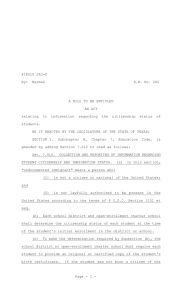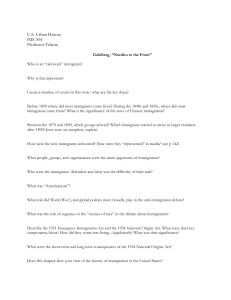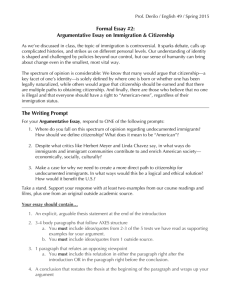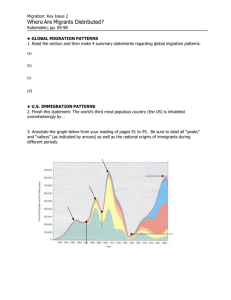News articles on immigration reform
advertisement
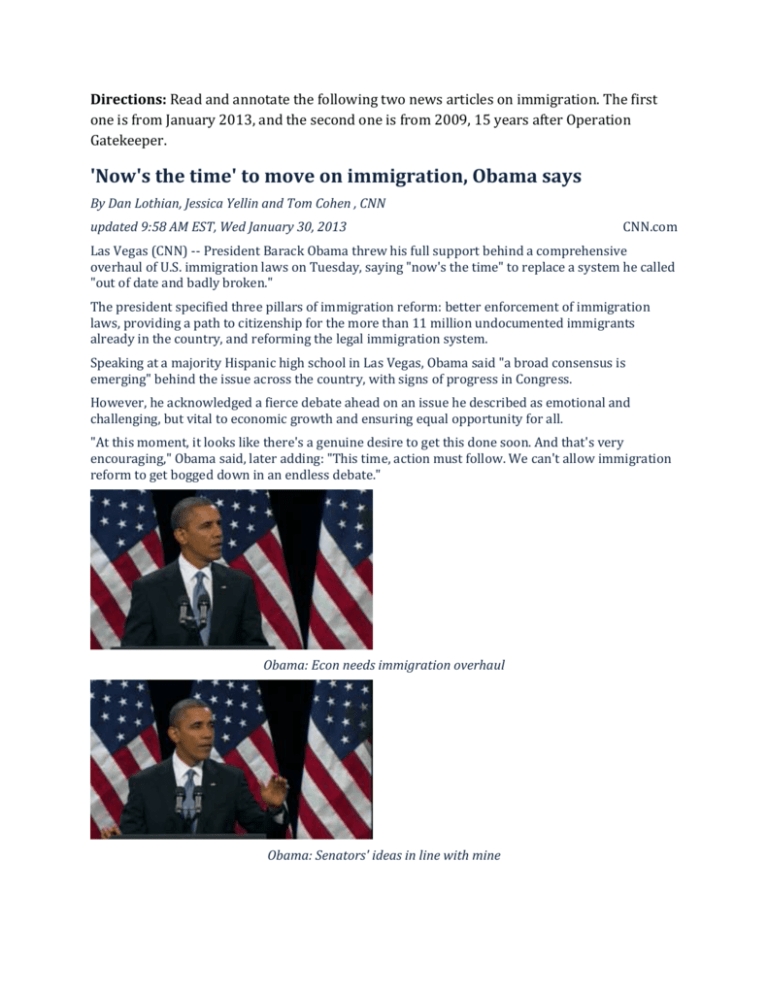
Directions: Read and annotate the following two news articles on immigration. The first one is from January 2013, and the second one is from 2009, 15 years after Operation Gatekeeper. 'Now's the time' to move on immigration, Obama says By Dan Lothian, Jessica Yellin and Tom Cohen , CNN updated 9:58 AM EST, Wed January 30, 2013 CNN.com Las Vegas (CNN) -- President Barack Obama threw his full support behind a comprehensive overhaul of U.S. immigration laws on Tuesday, saying "now's the time" to replace a system he called "out of date and badly broken." The president specified three pillars of immigration reform: better enforcement of immigration laws, providing a path to citizenship for the more than 11 million undocumented immigrants already in the country, and reforming the legal immigration system. Speaking at a majority Hispanic high school in Las Vegas, Obama said "a broad consensus is emerging" behind the issue across the country, with signs of progress in Congress. However, he acknowledged a fierce debate ahead on an issue he described as emotional and challenging, but vital to economic growth and ensuring equal opportunity for all. "At this moment, it looks like there's a genuine desire to get this done soon. And that's very encouraging," Obama said, later adding: "This time, action must follow. We can't allow immigration reform to get bogged down in an endless debate." Obama: Econ needs immigration overhaul Obama: Senators' ideas in line with mine Immigrant family fears being torn apart IL OKs undocumented immigrants' licenses The president spoke a day after eight senators -- four from each party -- introduced a framework for overhauling the immigration system that would provide an eventual path to citizenship for most of the more than 11 million undocumented immigrants in America. While touted as a breakthrough by its drafters, the plan was similar in many aspects to previous immigration reform efforts that have failed in recent years. Obama described the blueprint as a sign of renewed desire by Democrats and Republicans to tackle the issue, saying the plan was "very much in line with the principles I've proposed and campaigned on for the last few years." He was criticized by Latino activists for failing to deliver on a 2008 campaign promise to make overhauling immigration policy a priority of his first term. As his re-election campaign heated up last year, the Obama administration announced a halt to deportations of some young undocumented immigrants in a move that delighted the Latino community. Exit polls in November indicated that Latino voters overwhelmingly supported Obama over GOP challenger Mitt Romney, who had advocated a policy that amounted to forcing undocumented immigrants to deport themselves. Obama won Nevada, a battleground state with a large Hispanic population. Obama appeared on Tuesday at Del Sol High School, which has a 54% Hispanic student body, according to U.S. News and World Report rankings. To earn the opportunity for citizenship, Obama said undocumented immigrants must first pass a background check, learn English, pay a penalty, and then get "in the back of the line" behind people trying to come to America legally. Millions of undocumented immigrants would get immediate but provisional status to live and work in the United States, under the compromise plan crafted by the senate group. That outline also called for strengthening border controls, improved monitoring of visitors and cracking down on hiring undocumented workers. Only after those steps occurred could undocumented immigrants already in the country begin the process of getting permanent residence -- green cards -- as a step toward citizenship, the senators said at a news conference on Monday. Before Obama spoke on Tuesday, Republican Sen. Marco Rubio of Florida said any legislation based on the framework he helped draft must include tougher law enforcement sought by conservatives to get his vote. "We need border security, we need workplace enforcement, we need a visa tracking system," Rubio said, adding later that would oppose a bill that lacked language guaranteeing that "nothing else will happen unless these enforcement mechanisms are in place." Rubio and other senators involved in the bipartisan immigration effort said Monday they plan to provide a bill to the Senate Judiciary Committee in March, with hopes of getting the measure passed over the summer A few hours later, Obama said he would propose his own immigration bill if Congress failed to act on the issue in a timely manner. On the House side, a similar effort on immigration is said to be under way involving a group of Republicans and Democrats. Two senior House Democratic sources briefed on that effort told CNN the group was working to release some sort of outline of its plan soon, possibly as early as this week, but concede "they are not as far along as the Senate." The principles described by Obama on Tuesday were similar to the framework proposed Monday by the eight senators. Other conservatives immediately voiced their opposition to what they called amnesty, a code word on the political right for providing undocumented immigrants a path to legal status. "Our immigration laws aren't broken, they just aren't enforced," argued Rep. Lamar Smith, R-Texas, after Obama's speech. " ... We've been down this road before with politicians promising to enforce the law in return for amnesty. And then after the amnesty, they fail to make good on the enforcement promises. The American people should not be fooled. When you legalize those who are in the country illegally, it costs taxpayers millions of dollars, costs American workers thousands of jobs and encourages more illegal immigration." Republican Sen. Mike Lee of Utah objected to the framework by his Senate colleagues, saying the guidelines "contemplate a policy that will grant special benefits to undocumented immigrants based on their unlawful presence in the country." Rubio rejected such a characterization on Tuesday, saying that the framework would require undocumented immigrants to undergo a background check and face immediate deportation if they committed any serious crimes. Otherwise, they then would have to pay any taxes owed as well as a fine to get what Rubio called "the equivalent of a non-resident visa that allows you to work here." An opportunity to get a green card and possible citizenship would only come after the government undertakes other steps, such as increasing border security, he added. Obama, meanwhile, signaled disagreement with Republicans over the state of border security, saying in his speech that the Southwest border was more secure than ever. He mentioned steps to crack down on the hiring of undocumented workers, as well as unclogging the legal immigration system to encourage highly skilled and educated workers already in the country to remain instead of taking their expertise abroad. Democratic senators backing the framework unveiled Monday plan include Chuck Schumer of New York, Dick Durbin of Illinois, Robert Menendez of New Jersey and Michael Bennet of Colorado. On the Republican side were Rubio, John McCain of Arizona, Lindsey Graham of South Carolina and Jeff Flake of Arizona. Durbin said Tuesday that immigration reform must have bipartisan support to work, so it won't include everything everyone wants. "It's going to look different than what I might write, or the president might write," he said. Like the Senate framework, the House plan will include a path to citizenship, but details of how that will work are still being discussed. The Senate proposal is a good starting point, Rep. Joe Garcia, D-Florida, said Tuesday on CNN. "I think it puts us in a very good place," he said. A litany of left-leaning advocacy groups spoke out on the senators' plan, praising it as a good first step but cautioning against harming the rights of workers. "The people of this country are ready for us to be one country again without second-class people being mistreated simply because they lack paper, even though they are already contributing to our economy and our tax system," NAACP President Ben Jealous said. AFL-CIO President Richard Trumka told Yahoo News on Tuesday that his labor federation representing 12 million people will mount a "full-fledged" campaign in support of comprehensive immigration reform. "We think everybody ought to have the right to work hard and to progress to citizenship," Trumka said. Meanwhile, U.S. Chamber of Commerce President Tom Donohue has been in talks with Trumka on the issue. He said after Obama's remarks that American business hoped for changes this year. "We should seize this opportunity to create an immigration system that serves the interests of our economy, our businesses, and our society," Donohue said. In a sign of the heated public debate on the issue, a group of about two dozen protesters standing across the street from the Las Vegas high school waved signs opposing amnesty for undocumented immigrants as Obama's motorcade drove past. CNN's Dan Lothian in Las Vegas and Dana Bash, Ed Payne, Deirdre Walsh, Kevin Liptak, Catherine E. Shoichet , Jessica Yellin and Matt Smith contributed to this report, which was written by Tom Cohen in Washington. http://www.cnn.com/2013/01/29/politics/immigration-reform/index.html Operation Gatekeeper, 15 Years Later: Border crossing deaths: human rights violations? By Gene Cubbison NBC7 San Diego | Wednesday, Sep 30, 2009 | Updated 7:11 PM PST A shot of the U.S.-Mexico border fence The 15th anniversary of "Operation Gatekeeper" is being observed with outrage by humanitarian activists on both sides of the U.S.-Mexico border. They estimate that as many as 5,600 people have died while crossing the border through rugged mountain and desert areas of California, Arizona, New Mexico and Texas since the operation was launched Oct. 1, 1994. "If there was any other policy that the federal government adopted that systematically killed more than 500 people every year ... those policies would be changed quickly," said filmmaker John Carlos Frey, whose documentary "The 800 Mile Wall" is being released in conjunction with the anniversary. Frey's remarks came at a Wednesday news conference held by the American Civil Liberties Union's San Diego & Imperial Counties chapter. A movie 'trailer' and brief clips from the film -- which includes graphic footage of bones and corpses of border crossing death victims -- were screened for reporters and Mexican families who have relatives that recently became part of the body count. "If there were 500 Canadians that lost their lives crossing the border," Frey said, "The policy would be changed. The fact that they are 'no name, no face' people, the deaths continue." Officials with the American Civil Liberties Union released a study of Gatekeeper's effects -- the study was conducted by Mexico's National Commission Human Rights -- recommending that more Border Patrol resources be directed toward search-and-rescue operations and family assistance. The report also calls for "sensible and humane immigration and border policies ... to that end, reforms should provide legal and safe avenues for crossing the border ..." ACLU board member William Aceves explained that passage meant "facilitating the immigration process," not an open border. Added ACLU Executive Director Kevin Keenan: "We certainly are opposed to open borders, as such. We favor the national government's ability to control its borders and to control national security. "That said," Keenan continued, "what we oppose is the U.S., and to a lesser extent Mexico, violating international human rights with a death count that's now well over 5,000." In response, Peter Nunez, a board member of the Federation for American Immigration Reform, called the assertion of human rights violations "ludicrous." "All of these people who try to come in -- and some who die -- have made a choice." said Nunez, a former U.S. Attorney. "They have made a voluntary decision that they are willing to undergo the risk and danger to get out of Mexico, or wherever they're from, and come to the U.S ... Should we feel guilty because Mexico and other parts of the world have failed their own people, causing them to leave? No. I don't think the American people should have any guilt about that." http://www.nbcsandiego.com/news/politics/Operation-Gatekeeper-at-15--62939412.html


